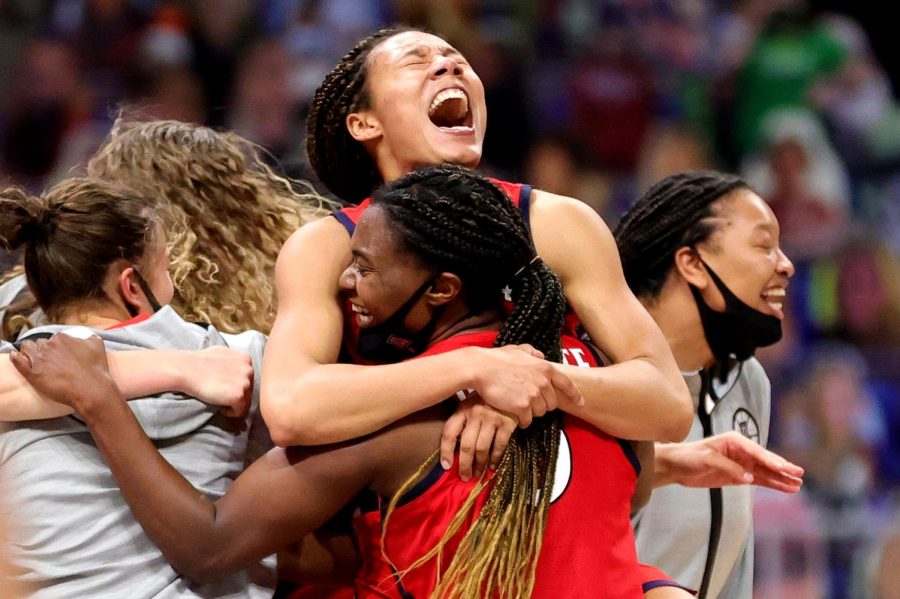Women’s History Month: Celebrating the Impact of Women in Sports as we Commemorate the 50th Anniversary of Title IX
March 16, 2022
Cal State East Bay honors the contributions women have made throughout history and in our culture and society.
California State University, East Bay Center for Sport and Social Justice, and the Diversity and Inclusion Student Center hosted a key event celebrating the 50th anniversary of the Title IX legislation, which protects people from sex-based discrimination in education programs or activities.
The hybrid event was held on March 8, from 12:15-1:15 p.m., featuring special guest speaker Dr. Cheryl Cooky, a professor of American studies and women’s gender and sexuality studies at Purdue University. In lieu of this celebration during Women’s History Month, East Bay head women’s basketball coach Shanele Stires and Assistant Athletic Trainer Delana Henderson shared their experiences, thoughts, and perspectives as women in the male-dominated world of sports.
During the event, Cooky discussed her research study regarding the politics of women in sport and media coverage.
She conducted the study in three iterations. “In the first three iterations of this study in the late 80s and early 90s, much of the coverage and content focused on sexualizing women athletes, objectifying them, using them as objects of humor and sexualization,”Cooky remarked.
Notably, some changes occurred during the new millennium. “There have been important changes over time. From 2004-2009 we saw somewhat of a drop in that. In fact,…more seemingly respectful stories (ambivalent coverage), often focus on women athletes in gender-appropriate or gender-stereotypical roles: segments on athletes being a mother or pregnant or being the girlfriend of another male athlete,” Cooky stated.
However, there are still discrepancies in the type of coverage women athletes receive. “That pattern dropped out in the latest iterations of the study in 2014-2019. We’re talking about women athletes as athletes; we’re featuring them on the field in their sport, being competitive. We noticed that the delivery and production values were much lower for the segments on women sports. We describe this phenomenon as gender bland sexism,” she continued.
Women play a key role in sports as their impact is integral to change-driven leadership and outcomes. Coach Stires believes it’s critical in leveling the playing field by allowing men and women to see each their similarities in one another. “I think it’s the great equalizer in our society for women receiving equal pay and equal treatment and evolving what we used to think [of] as normal gender roles,” Coach Stires stated.
Representation matters! Women need to be represented in sports because it gives the younger generation an opportunity to see themselves and believe that they too can make a difference.
“It’s important for women to have a role in sports so women of the younger generation can see their future selves in a capacity they might not have thought was available to them. Oftentimes, women do not get the same recognition as men when it comes to being athletes or working in sports. The more of us working in sports there are, the more our impact can be felt. It lets young women know that they can have a role on the court or behind the scenes, and gives men a perspective that certain jobs are not just exclusive to them,” stated Delana Henderson, MS, ATC, Assistant Athletic Trainer for Sports Medicine at CSUEB.
Henderson also encourages women to assert themselves when working with athletes, advocating for fair treatment.
One of the greatest barriers to women athletes is visibility. However, the sports world is showing more attention to women’s sports. “The NCAA and WNBA paired with ESPN have created a higher level of visibility over the past 30 years, which has allowed the game of women’s basketball and the visibility of women in sport to grow, and it continues to grow,” Stires stated.
Henderson acknowledges that the lack of visibility correlated with the media coverage. Significantly, these sentiments correlate with Cooky’s findings during the third iteration of her research study.
“The biggest noticeable difference, in my opinion, is the lack of media attention and advertisement of women’s sports. When men are competing, there are commercials, ads, billboards, etc. to help create hype and excitement around their competitions, even for regular-season games,” Henderson stated.
Although it’s been a slow and steady process for women in sports, women have their say in sports. “I think that it’s a slow process for women and minorities to have access to ownership and leadership positions, but you can see the evolution and advancement of women in Athletic director positions, such as the recent hiring of our female athletic director Allison Kern (she is inspiring younger women that leading an athletic department is a real possibility),” Stires explained.
Slowly but surely, changes are being made; women are now filling spaces and roles throughout sports typically filled by men. “Men are still looked at and see themselves as gatekeepers in certain aspects…in other words, it’s an all-boys club. But, fortunately, I have seen some changes with more female presidents, owners, coaches, referees, and athletic trainers,”Henderson noted.
Getting into these positions and roles as a woman is not for the faint of heart. “I have learned that you have to work three times harder than you think you would need to. In the world of sports, the win-loss column is what you are ultimately judged on,” Stires stated.
In like manner, women have to mark their limits and define how they will and should be treated. “Sometimes, you will have to work harder to be seen as equal. In Athletic Training specifically, it can be a thankless job, especially for women who are looked at in a caregiver capacity. Come into your position ready to work, understanding that things won’t always be fair. Demand respect, set boundaries, and never compromise your integrity,” Henderson continued.
More importantly, are the lessons learned. “What I have learned most, however, is the power of team and sport to change lives and allow women opportunities to grow and self-actualize. It’s an amazing platform, and for that, we will forever be grateful for title 9. I love what I do and am grateful every day for the opportunity that I have to coach such an incredible group of young women on our team,” Stires concluded.
“I’ve learned that if you are good at your job, show value in the work that you provide, and respect yourself, you will receive respect back,” Henderson added.
It’s important to honor women’s contributions throughout history, from celebrating the 50 years of Title IX to now and even the future. Women continue to break glass ceilings and defy the preset ideologies of womanhood.

















